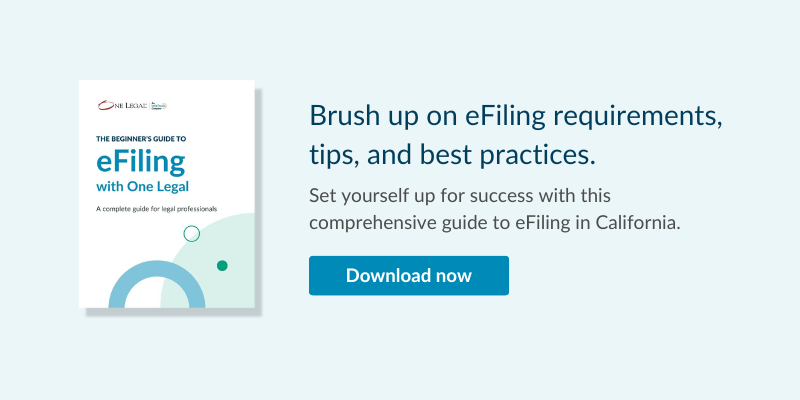It’s that time again!
33 days until eFiling becomes permissive for Limited Civil case types in Los Angeles Superior Courts (LASC)! Not that we’re counting.
This is the second in our Los Angeles County eFiling series, which you can follow by subscribing to our blog or checking back weekly for new installments.
Start with our article on Top 10 resources for eFiling in Los Angeles County to start training and reading about eFiling in your court.
As you pore over the resources we sent last week, we decided to do a quick “eFiling 101” for anyone who hasn’t eFiled yet, in this county or any other.
Definition: eFiling
In the legal world, eFiling is short for “electronic court filing,” the process of electronically submitting legal documents to the court for filing.
Read more: eFiling terms every legal professional should know
There are 4 steps to the eFiling process.
- Typically, a filer logs onto a court-approved electronic filing service provider (EFSP) where the filer enters basic information related to the case, pays any applicable fees and uploads the documents.
- The documents are then securely submitted for filing from the EFSP’s portal, via the electronic filing manager (EFM) as the back-end system to the court’s case management system.
- The filing is then reviewed by a court clerk and if accepted, added to the case’s electronic docket.
- Accepted documents or notifications of rejected filings are returned to the filer through their EFSP.
Read more: How eFiling works [infographic]
Who is required to eFile?
LASC has established a voluntary or permissive period when eFiling is first introduced. This allows attorneys and other legal professionals to incorporate eFiling into their practice while still transitioning from physical or fax filing.
Once a court mandates eFiling, however, attorneys are required to eFile. That’s why we’ve created a complete list of resources that can help you eFile with ease.
There is an exception in place for self-represented litigants, who are not required to eFile, but may choose to do so if desired.
See current timeline for eFiling.
Deadlines and filing hours
You may submit your filings electronically 24 hours a day. Any filings received up to 11:59 p.m. will be deemed received or filed on the same business day; any filings submitted after midnight will be deemed received or filed the next business day.
To ensure that your filing is fully transmitted before the midnight deadline, One Legal recommends submitting orders no later than 11:45 p.m.
What to look for in an EFSP
Los Angeles is in the process of certifying several EFSPs to give filers options to choose from, with a variety of features and functions between each one. Some are new, small companies with a limited range of experience and services. Others, like One Legal, have three decades of experience and file close to a million documents every year.
Read How to choose an electronic filing service provider in your state to help you choose the EFSP that’s right for you.
What are the costs to eFile?
There are five types of typical fees you might expect to encounter:
- Standard court filing fees: the same fees you’ve always been charged by the court, varying depending on the filing type, the court, the case, and more.
- Service provider fees: charged by your EFSP to replace the expenses you used to pay for physical delivery, a.k.a. runners.
- Court technology fees: Transitioning to a new eFiling system is not cheap, so some courts charge a small fee to recover costs associated with running the eFiling system. In LA, you’ll see a fee of $1.75 per filing.
- EFM service fees: In Los Angeles, EFMs will charge a service fee for use of their e-filing system in the range of $2.45 up to $3.50 depending on the case type.
- Convenience fees: your EFSP of choice is also disbursing court filing fees on your behalf, they might be also charging you a convenience fee for this service. One Legal waives this fee when users choose to set up payment by ACH.
To help keep eFiling simple, One Legal pays all required fees upfront on your behalf and provides downloadable, itemized invoices for each eFiling, which you can use to create customized statements.
Want to know if costs for eFiling are recoverable or not? Refer to Code of Civil Procedure section 1033.5(14).
All EFSPs accept a variety of different forms of payment. One Legal accepts all credit cards, including American Express, as well as ACH.
That’s our dose of LA info for the week. Check back next week for more!








